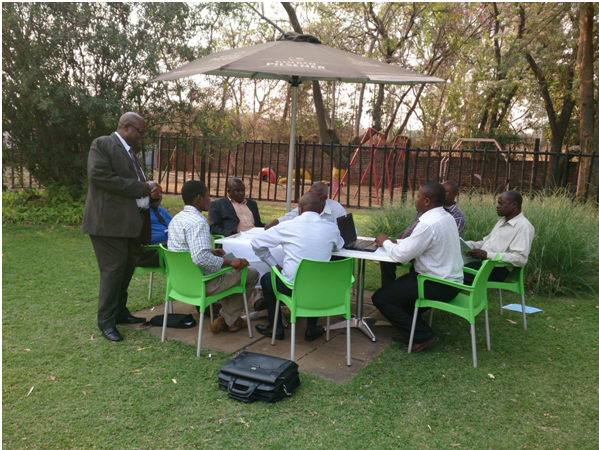The workshop which was held from the 12-13 September 2013 in Kadoma, about 140km south-west of Harare, attracted over 65 participants. The participants were chairpersons from some of the 47 Sub-catchment and 7 Catchments in Zimbabwe, and officials from MWRDM and Zimbabwe National Water Authority (ZINWA). According to the Zimbabwe Water Act of 1998, Sub-catchments and Catchments are statutory stakeholder institutions empowered to manage water resources with ZINWA as their key technical partner. MWRDM, now known as the Ministry of Environment, Water and Climate is a key implementing partner of the WACDEP Programme in Zimbabwe.
The aim of the Catchments and Sub-Catchments Consultation and Action Planning Workshop was to contribute towards the review and submission of written comments for the first draft of the National Climate Change Response Strategy for Zimbabwe (NCCRS). The process of developing an NCCRS for Zimbabwe is being driven by the former Ministry of Environment and Natural Resources Management, and is being facilitated by the Institute of Environmental Studies, University of Zimbabwe.
The NCCRS, presently in draft form, is currently going through a multi-stage participatory review process, opening it to scrutiny from different stakeholders of diverse backgrounds. A total of 25 consultations covering all Zimbabwe's 10 provinces will be held by December 2013, giving stakeholders, especially vulnerable communities and grassroot establishments, such as Sub-catchment and Catchment stakeholders, an opportunity to give input into the process before it becomes final by the end of 2013. WACDEP Zimbabwe is supporting the National Climate Change Office and National Climate Change Task Force consultations on four of the 25 consultative workshops which are water-related.
WACDEP Zimbabwe is also expected to support the final consultative workshop. Apart from the four workshops where it is giving direct support, WACDEP Zimbabwe will be tracking all the 25 workshops to ensure that water, climate and developmental issues are considered during action planning for other others sectors being consulted such as local leadership, women, and children.
The Kadoma workshop specifically contributed towards key values to the NCRRS development process by achieving the following objectives:
- Consultation from the grassroots was recognized, thus strengthening knowledge and understanding of how different catchments in Zimbabwe are dealing with water security and climate resilience issues. Thus the representation from various stakeholders enabled the integration of cross-cutting issues across the work programmes.
- Stakeholders managing catchments and sub-catchments were informed about the effects of climate and the WACDEP Programme and its intended objectives in Zimbabwe. Stakeholders specifically appreciated the role that regional initiatives (such as the WACDEP) in complementing national efforts promoting sustainable development.
- The workshop built capacities of the stakeholders through experts’ presentations and hands-on action planning through identification and prioritization of investments that promote water security and climate resilience in Zimbabwe.
- Participants were able to review relevant elements relating to the implementation, investment, and institutional frameworks of the NCCRS and ensured that water security and climate resilience are mainstreamed in the Strategy. Specific actions and priorities relating to adaptation and mitigation were therefore identified in consultation with stakeholders.
Recognizing the need that achieving the NCCRS’s vision requires substantial and additional financial resources to implement the proposed actions to build on the finance and investment framework of the NCCRS, practical adaptation actions promoting water security and climate resilient development implemented on the ground were identified with the view to develop Climate Change Funding for these projects. Investment options promoting water security and climate resilience were therefore integrated into the development planning processes and were prioritized in the development of the Climate Change Action Plan.
The whole consultative process is linked to WACDEP’s Component 1: Investments in regional and national development, with a special emphasis on Work package 2: National development and sector plans, where WACDEP Zimbabwe is supporting the formulation of a National Climate Change response strategy for the whole country. The NCCRS will produce work plans for all sectors and WACDEP Zimbabwe is targeting water related sectors, which will also directly feed into work packages 5 (Demonstration projects) and 8 (Governance and Sustainability).
By contributing to the NCCRS development process in Zimbabwe, WACDEP is building on on-going initiatives that are aimed at ensuring climate resilience development, the work of developing the NCCRS for Zimbabwe being one of the many initiatives.
